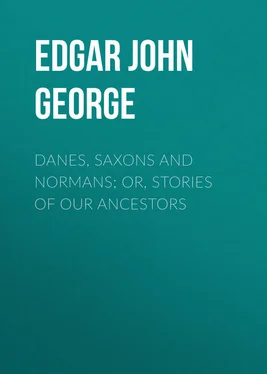John Edgar - Danes, Saxons and Normans; or, Stories of our ancestors
Здесь есть возможность читать онлайн «John Edgar - Danes, Saxons and Normans; or, Stories of our ancestors» — ознакомительный отрывок электронной книги совершенно бесплатно, а после прочтения отрывка купить полную версию. В некоторых случаях можно слушать аудио, скачать через торрент в формате fb2 и присутствует краткое содержание. Жанр: foreign_antique, foreign_prose, Историческая проза, на английском языке. Описание произведения, (предисловие) а так же отзывы посетителей доступны на портале библиотеки ЛибКат.
- Название:Danes, Saxons and Normans; or, Stories of our ancestors
- Автор:
- Жанр:
- Год:неизвестен
- ISBN:нет данных
- Рейтинг книги:5 / 5. Голосов: 1
-
Избранное:Добавить в избранное
- Отзывы:
-
Ваша оценка:
- 100
- 1
- 2
- 3
- 4
- 5
Danes, Saxons and Normans; or, Stories of our ancestors: краткое содержание, описание и аннотация
Предлагаем к чтению аннотацию, описание, краткое содержание или предисловие (зависит от того, что написал сам автор книги «Danes, Saxons and Normans; or, Stories of our ancestors»). Если вы не нашли необходимую информацию о книге — напишите в комментариях, мы постараемся отыскать её.
Danes, Saxons and Normans; or, Stories of our ancestors — читать онлайн ознакомительный отрывок
Ниже представлен текст книги, разбитый по страницам. Система сохранения места последней прочитанной страницы, позволяет с удобством читать онлайн бесплатно книгу «Danes, Saxons and Normans; or, Stories of our ancestors», без необходимости каждый раз заново искать на чём Вы остановились. Поставьте закладку, и сможете в любой момент перейти на страницу, на которой закончили чтение.
Интервал:
Закладка:
No sooner did Sweyn hear of the massacre of St. Brice, than he vowed revenge, and, embarking with a mighty force, landed in England, and commenced a work of bloodshed, carnage, sacrilege, destruction, and every kind of enormity. Ethelred, after a vain attempt at resistance, fled to Normandy, with Emma his wife, and their two sons, Alfred and Edward; while Sweyn, left a victor, caused himself to be proclaimed King of England. But he did not live long to enjoy his conquests. One day, while feasting at Thetford, drinking to excess, and threatening to spoil the monastery of St. Edmund, he suddenly felt as if he had been violently struck, and the chiefs, who sat around in a circle, observed that his face underwent a rapid change.
"Oh!" exclaimed Sweyn, gasping for breath, "I have been struck by this St. Edmund with a sword!"
"Nay," said the Danish chiefs, who did not share their King's superstitious feeling, "there is no St. Edmund here."
Death, however, seemed written on Sweyn's face, and horror took possession of his soul. After suffering terrible tortures for three days, he breathed his last, and left his claims and pretensions to his son Canute, who, coming victoriously out of that struggle with Edmund Ironsides, in which the royal Saxon, after repeatedly defeating the Danes, perished by the hand of an assassin, succeeded to the English throne, where he was destined to render his name memorable and his memory illustrious as Canute the Great.
It appears that, during these unfortunate struggles with the Danes, Ethelred and his son Edmund Ironsides relied much on the services of a man whom the Saxon King delighted to honour, and whom English historians have since branded as one of the most infamous traitors that ever breathed English air. This was Edric Streone, who had obtained from Ethelred the Earldom of Mercia, and who evinced his gratitude for that and countless favours by betraying his benefactor and suborning a ruffian to stab his benefactor's son.
After Ironsides' murder, Edric hastened to Canute and claimed a reward. Not unwilling, perhaps, to profit by the treachery, but abhorring the traitor, the Danish conqueror had recourse to dissimulation, and spoke to Edric in language which raised the villain's hopes.
"Depend upon it," said Canute, "I will set your head higher than any man's in the realm;" and, by way of redeeming his promise, he soon after ordered the traitor to be beheaded.
"King," cried Edric, in amazement, "remember you not your promise?"
"I do," answered Canute, with grim humour. "I promised to set your head higher than other men's, and I will keep my word." And having ordered Edric to be executed, he caused the body to be flung into the Thames, and the head to be placed high over the highest of the gates of London.
After having won considerable popularity among the Saxons by the execution of Edric Streone, Canute, who figured as King of Denmark and Norway, as well as England, endeavoured to strengthen his position by a matrimonial alliance. With this view the royal Dane wedded Emma of Normandy, the widow of Ethelred; and it was supposed that, at his death, Hardicanute, the son whom he had by this fair descendant of Rolfganger, was to succeed to the English throne.
In 1035, however, when Canute the Great went the way of all flesh, and when his remains were laid in the Cathedral of Winchester, there was living in London one of his illegitimate sons, named Harold, who, from his swiftness in running, was surnamed Harefoot. Immediately, Harold Harefoot claimed the crown, and a contest took place between his adherents and those of Hardicanute, who was then in Denmark. Harold Harefoot, however, being favoured by the Danes of London, carried the day; and finding that the Archbishop refused to perform the ceremony of coronation, he placed the crown on his head with his own hand, became an avowed enemy of the Church, lived as one "who had abjured Christianity," and displayed his contempt for religious rites by having his table served and sending out his dogs to hunt at the hour when people were assembling for worship.
After reigning four years, however, he breathed his last, and was buried at Westminster.
When Harold Harefoot died, Hardicanute was at Bruges with his mother, the Norman Emma, and he immediately sailed for England. No attempt seems to have been made to restore the Saxon line. Indeed, Hardicanute found himself received with general joy, and commenced his career as King of England by causing the body of his half-brother to be dug out of his tomb at Westminster and thrown into the Thames. Hardicanute then abandoned himself to gluttony and drunkenness, and scandalously oppressed the nation over which he swayed the sceptre. His career, however, was brief, and his end was so sudden, that some have ascribed it to foul play.
It was the 8th of June, 1041, and Hardicanute was celebrating the wedding of a Danish chief at Lambeth. Nobody expected a catastrophe, for he was still little more than twenty, and his constitution was remarkably strong. While revelling and carousing, however, he suddenly tossed up his arms and dropped on the floor a corpse. Some ascribed the death of Hardicanute to poison, but none lamented his fate; and, by the Saxons, the event was rather hailed as a sign for the restoration of the Saxon line and the heirs of Alfred.
IV.
EARL GODWIN
ONEmorning, at the time when Edmund Ironside and Canute were struggling desperately for the kingdom of England, and when the son of Ethelred had just defeated the son of Sweyn in a great battle in Warwickshire, a Danish captain – Ulf by name – separated from his men, and, flying to save his life, entered a wood with the paths of which he was quite unacquainted. Halting in one of the glades, and looking round in extreme perplexity, he felt relieved by the approach of a young Saxon, in the garb of a herdsman, driving his father's oxen to the pastures.
"Thy name, youth," said Ulf to the herdsman, saluting him after the fashion of his country.
"I," answered the herdsman, "am Godwin, son of Wolwoth; and thou, if I mistake not, art one of the Danes."
"It is true," said Ulf. "I have wandered about all night, and now I beg you tell me how far I am from the Danish camp, or from the ships stationed in the Severn, and by what road I can reach them."
"Mad," exclaimed Godwin, "must be the Dane who looks for safety at the hands of a Saxon."
"Nevertheless," said Ulf, "I entreat thee to leave thy herd and guide me to the camp, and I promise that thou shalt be richly rewarded."
"The way is long," said Godwin, shaking his head, "and perilous would be the attempt. The peasants, emboldened by victory, are everywhere up in arms, and little mercy would they show either to thee or thy guide."
"Accept this, youth," said the Dane, coaxingly, as he drew a gold ring from his finger.
"No," answered Godwin, after examining the jewel with curiosity, "I will not take the ring, but I will give you what aid I can."
Having thus promised his assistance to Ulf, Godwin took the Danish captain under his guidance, and led him to Wolwoth's cottage hard by, and, when night came, prepared to conduct him, by bye-paths, to the camp. They were about to depart when Wolwoth, with a tear in his eye, laid his hand in that of the Dane.
"Stranger," said the old man, "know that it is my only son who trusts to your good faith. For him there will be no safety among his countrymen from the moment he has served you as a guide. Present him, therefore, to Canute, that he may be taken into your king's service."
"Fear not, Saxon," said Ulf, "I will do more than you ask for your son. I will treat him as my own."
The Dane and Godwin then left Wolwoth's cottage, and, under the guidance of the young herdsman, the Dane reached the camp in safety. Nor was his promise forgotten. On entering his tent, Ulf seated Godwin on a seat as highly-raised as his own, and, from that hour, treated him with paternal kindness.
Читать дальшеИнтервал:
Закладка:
Похожие книги на «Danes, Saxons and Normans; or, Stories of our ancestors»
Представляем Вашему вниманию похожие книги на «Danes, Saxons and Normans; or, Stories of our ancestors» списком для выбора. Мы отобрали схожую по названию и смыслу литературу в надежде предоставить читателям больше вариантов отыскать новые, интересные, ещё непрочитанные произведения.
Обсуждение, отзывы о книге «Danes, Saxons and Normans; or, Stories of our ancestors» и просто собственные мнения читателей. Оставьте ваши комментарии, напишите, что Вы думаете о произведении, его смысле или главных героях. Укажите что конкретно понравилось, а что нет, и почему Вы так считаете.












